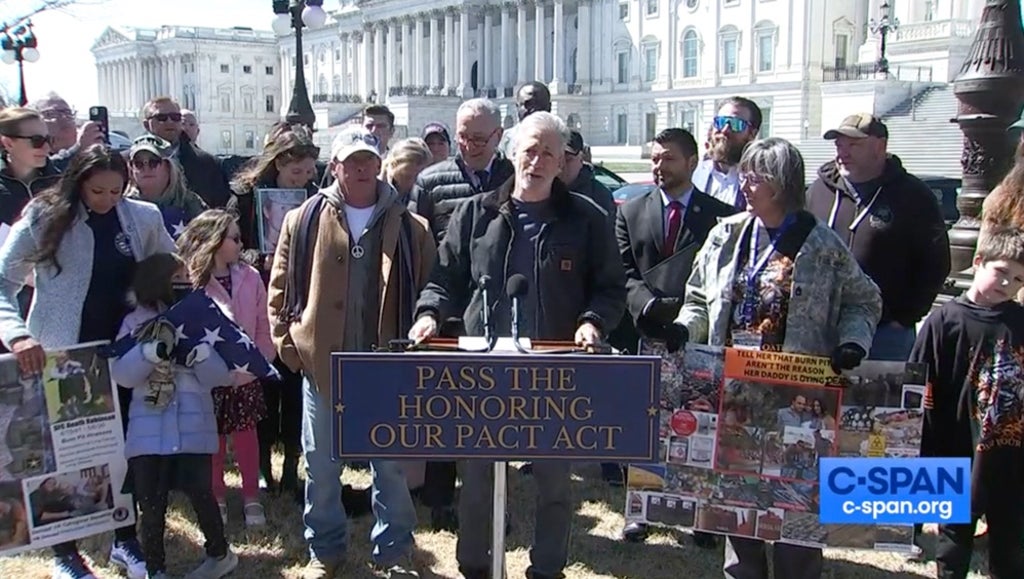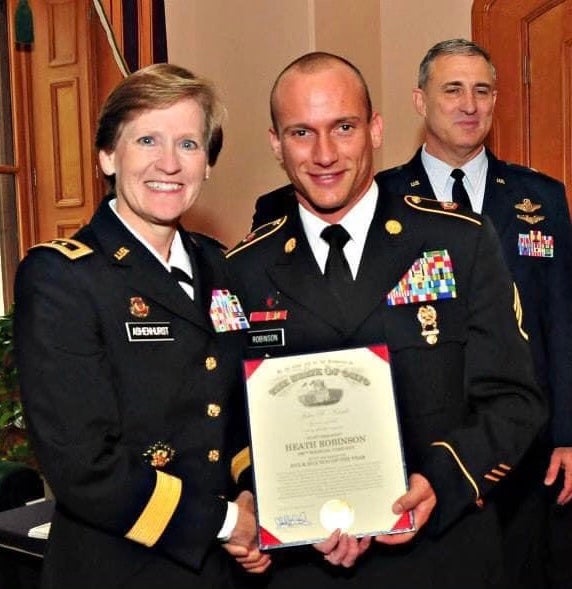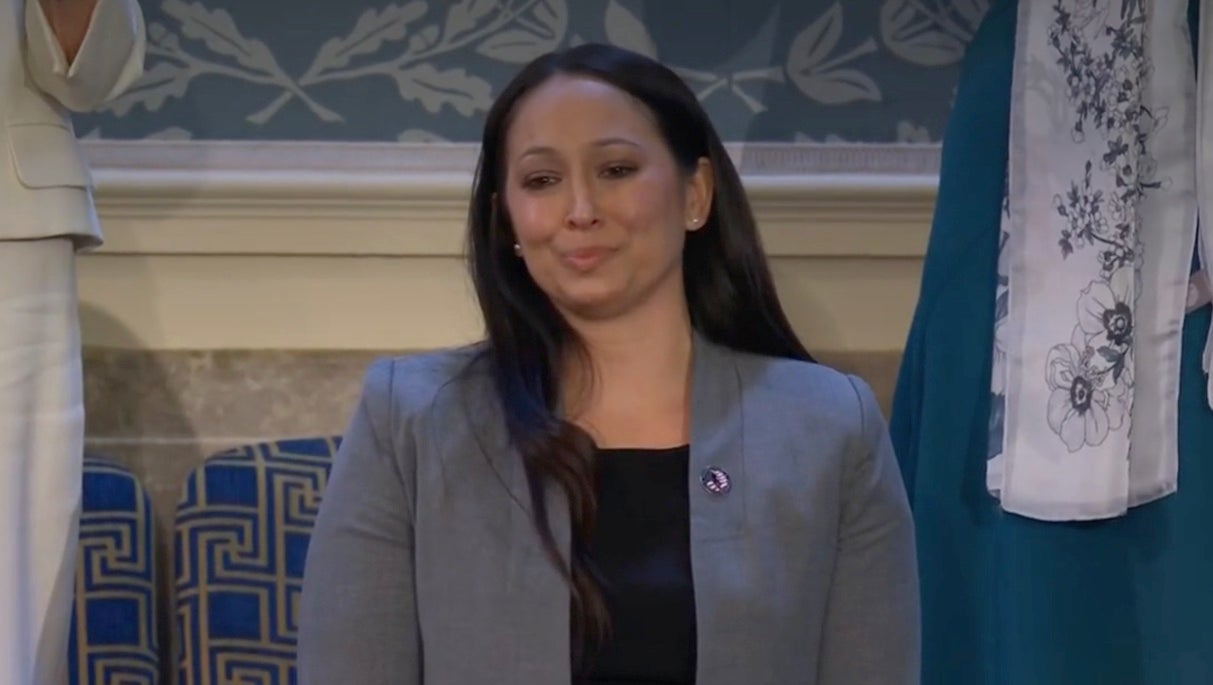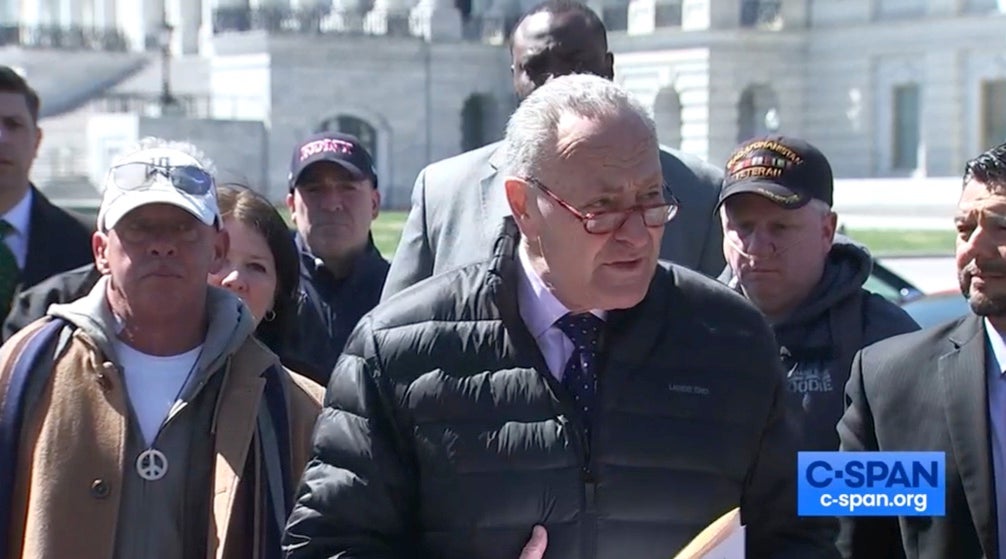
TV host Jon Stewart has told lawmakers they can’t say they are “American first when you put veterans last” as he called on the US Senate to pass a comprehensive bill that will grant access to healthcare to veterans who are sick and dying from burn pits.
The veterans advocate said at a press conference in Washington DC on Tuesday afternoon that it is “unconscionable” to delay the legislation any longer as he questioned how senators would respond if there was a burn pit right there on Capitol Hill.
“You want to do it here? Let’s dig a giant f***ing pit 10 acres long and burn everything in Washington with jet fuel and then let me know how long they want to wait before they think it’s causing some health problems,” said Mr Stewart.
“Here’s the bottom line: you cannot be American first when you put veterans last.”
His comments came ahead of a Senate Veterans’ Affairs Committee later on Tuesday with VA Secretary Denis McDonough about the newly-renamed burn pits bill now heading to a Senate vote.
The Honoring Our PACT Act has been renamed the SFC Heath Robinson PACT Act, in honour of the late Sgt First Class Heath Robinson – the US veteran whose story was told in Joe Biden’s State of the Union address.
Sgt Robinson died in May 2020 aged 39 from a rare form of cancer caused by toxic exposure to burn pits while serving in Iraq in the Ohio National Guard in 2006 and 2007.
Before his death, he and his wife Danielle Robinson fought for other veterans who are sick and dying from burn pits exposure to get access to much-needed healthcare and benefits when they return home from serving their country overseas.
Ms Robinson told The Independent on Tuesday morning that it is “bittersweet” to see her husband being honoured with the renaming of the bill.
“There’s lots of different emotions playing a part in it,” she said.
“It’s an honour to him and his memory is going to live on through it but at the same time I’d rather have him alive with us.”
She added: “I can’t help but think of all the other widows who are deserving of having their loved ones named on the PACT Act.
“It’s not just about our story but all of the other widows out there fighting the battle and losing their loved ones because of toxic exposure to burn pits and it’s about all the current veterans trying to fight for the healthcare they deserve.”
Ms Robinson joined Mr Stewart, fellow veteran advocate John Feal, New York Democratic Senators Chuck Schumer and Kirsten Gillibrand and other lawmakers and members of the veteran community in pushing for the PACT Act to be passed into law in Tuesday’s press conference.
She thanked them for changing the name in honour of her husband as she spoke about his heartbreaking dying moments at the age of 39.

“When I had to call hospice in to our house to start the process of helping my husband die he said ‘I don’t know who to give up. I don’t know how to take my last breath,’” she said.
“I need all of you senators to understand what it is like to lay on the floor underneath your dying husband for seven hours helping him die.
“If you pass this Honoring Our PACT Act you are going to help so many veterans who are in the same situation – on hospice right now, for those who may have to come, and hopefully take care of those who have cancers that are curable.
“I ask you to do your duty and pass this.”
The bill passed the House earlier this month, with all Democrats and 34 Republicans voting in favour of its passage, sending it to the Senate.
If it passes, the law will presumptively link 23 cancers, respiratory illnesses and other conditions to a veterans’ exposure to burn pits while on deployment overseas.
This will then give these veterans automatic access to the VA healthcare and benefits that they need as they battle the illnesses they developed as a result of serving their country.
During America’s post-September 11 wars, huge open-air pits were used to burn mountains of trash including food packaging, human waste and military equipment on bases in Iraq and Afghanistan.
Thousands of US service members returned home from deployment and developed health conditions including rare cancers, lung conditions, respiratory illnesses and toxic brain injuries caused by breathing in the toxic fumes from the pits.
A staggering 3.5m servicemembers and veterans have been exposed to burn pits and airborne toxins while serving the US overseas, according to estimates from the Veterans Affairs.
But, at present, the burden of proof is on veterans to prove their condition is directly caused by this toxic exposure and so only around one in five claims for disability benefits where burn pits are cited are approved by the VA.
Veterans sick and dying from exposure to burn pits have been fighting for years to get access to the healthcare and benefits they need for their war-related illnesses.

Senate Majority Leader Schumer said at Tuesday’s press conference that the nation is at a “turning point” on the issue and vowed that the Senate will vote on the bill during this Congress.
“Everyone will have to show where they stand and whose side they are on,” he said.
Mr Schumer said: “Today we’re at a turning point, a very important turning point.
“Over the last two decades of war in Iraq and Afghanistan and beyond, America has always claimed no expense is too great, no treasure too precious for us to pay to defend our freedom and our American way of life.
“Hundreds of thousands of men and women answered that call leaving behind their families and putting their lives on the line but until now we have refused to face up to one of the biggest costs of those wars and that is the healthcare needs of veterans who fought and sacrificed on our behalf.”
Mr Stewart, who together with 9/11 survivor John Feal lobbied the government to pass a bill giving healthcare access to emergency responders at the September 11 terrorist attacks before the pair rallied in support of veterans, said it will only take 10 Republicans to join all Senate Democrats to get the bill passed into law.
“You see the entire veteran community standing together united as one to get this done and it’s going to come down to what it always come down to here – we need 10 Republicans that’s it,” he said.
“After 20 years of fighting, that’s what it’s going to come down to. Ten Republicans and the veterans finally get the healthcare and the benefits that they fought so hard for, that they earned, that they are sick and dying for.”
He said there will be “a lot of nonsense” during the afternoon’s Senate hearing, with people saying they want to support veterans but also “want to be responsible”.
He hit out at these claims, saying that “they had their chance to be responsible and they blew it”.
“You know what would have been nice? If they had been responsible 20 years ago and hadn’t spent trillions of dollars on overseas adventures, if they had been responsible and not spent billions of dollars on defence contractors that poisoned our troops,” he said.
“If they had been responsible and understood that 20 years of war would create an overflow of sick veterans paying for the consequences of that war.”

In Tuesday afternoon’s hearing, VA Secretary McDonough testified that both he and the president support the bill and said that “addressing toxic exposure is a top priority of this administration”.
“The president is pushing pretty hard for us to move [on the issue],” he said.
“There’s a lot of suffering out there and the president has been very clear about what I need to do to address it.”
Mr Biden has said on several occasions that he believes his own son Beau Biden may have died as a result of his exposure to burn pits on deployment overseas.
Mr McDonough pointed out that the VA is reviewing a link between burn pits and constrictive bronchiolitis - a rare form of cancer - and is proposing a rule to add some rare respiratory cancers to the presumptive list of conditions.
However, the VA secretary came under sharp questioning from Democratic Senator Bernie Sanders who questioned why money was being spent on “bureaucracy”.
Mr Sanders said that - rather than wasting money on “bureaucracy” to try to determine if a veteran’s condition was caused by burn pits and so whether or not they are eligible - someone being a veteran and being sick should be enough of a reason to ensure they have access to healthcare.
The US should be saying “if you were a veteran who put your life on the line to defend this country you are going to get the healthcare you need,” he said.
“If you have two people who are ill we want to take care of them both - as humans and as veterans,” he said.
“I would hope that we can all agree that if we’re spending a dollar on VA healthcare we’re spending it on healthcare rather than bureaucracy to see if that person should get healthcare.”
Republican Senator Jerry Moran said that the bill “will stretch the VA beyond its operational capacity, providing no guarantee that veterans will be able to access the benefits promised”.
However Kristina Keenan, associate director of the National Legislative Service Veterans of Foreign Wars of the United States, said that the veteran community is “fully aware” that the VA will need more technology and personnel to process the rise in claims if the bill passes.
“That should not slow the process,” she said.
“Veterans would rather be in the queue than knocking on the door not able to get in.”
The VA is already hiring additional resources to deal with a rise in claims.
She also pushed back on the arguments from some lawmakers that the bill will be too costly, saying “this is the cost of war”.
Senate Veterans’ Affairs Committee chairman Senator Jon Tester agreed: “Right now, our veterans are the ones that are paying that cost. I don’t believe they can wait any longer.”
For any senators sitting on the fence about the issue or who say budget is an issue, Ms Robinson said that veterans have “put their lives on the line” for their country and so deserve to be taken care of when they suffer war-related illnesses on their return home.
“Bottom line is you have the money to send them off to war, you need to take care of them when they come home with war-related illnesses and are fighting for their lives and living the last days of their lives,” she told The Independent.
“They sign up and put their lives on the line and sacrifice so much so for us [so] to sacrifice a little bit by taking care of them when they come home is not a lot to ask for.”
Ms Robinson urged any lawmakers not familiar with the issue of burn pits to educate themselves by watching the “Delay, Deny, Hope you Die” movie and reading Joseph Hickman’s The Burn Pits: The Poisoning of America’s Soldiers.
“Maybe then they will get a glimpse of the reality and of what it is like living in our shoes and the frustration and anger and hurt experienced when our veterans come home,” she said.
The veteran’s widow was invited to the State of the Union address by First Lady Jill Biden, where the president dedicated part of his speech to telling her husband’s story and to speaking about the issue of burn pits.
“He was born a soldier. Army National Guard. Combat medic in Kosovo and Iraq,” Mr Biden said.
“Stationed near Baghdad, just yards from burn pits the size of football fields.
“Danielle is here with us tonight. They loved going to Ohio State football games. And he loved building Legos with their daughter.
“But cancer from prolonged exposure to burn pits ravaged Heath’s lungs and body.
“Danielle says Heath was a fighter to the very end. He didn’t know how to stop fighting, and neither did she.
“Through her pain, she found purpose to demand that we do better. Tonight, Danielle, we are going to do better.”
Since the president dedicated part of his State of the Union address to the topic of burn pits, Ms Robinson said she has noticed a shift in public awareness of the issue.
People have come up to her saying they had never even heard about the issue impacting thousands of American servicemembers until that moment, she said.
“I fully believe that people are more on board with this and that the civilian world is starting to learn what they did to our soldiers and what they were exposed to,” she said.
“Lots of people have come up to me and said they were very shocked to hear about it and that they had no idea what burn pits were before,” she said.
“I feel like it’s still a battle and we need to get the bill passed but it’s laying more of the foundation for what veterans need and bringing more light onto the issue.”







